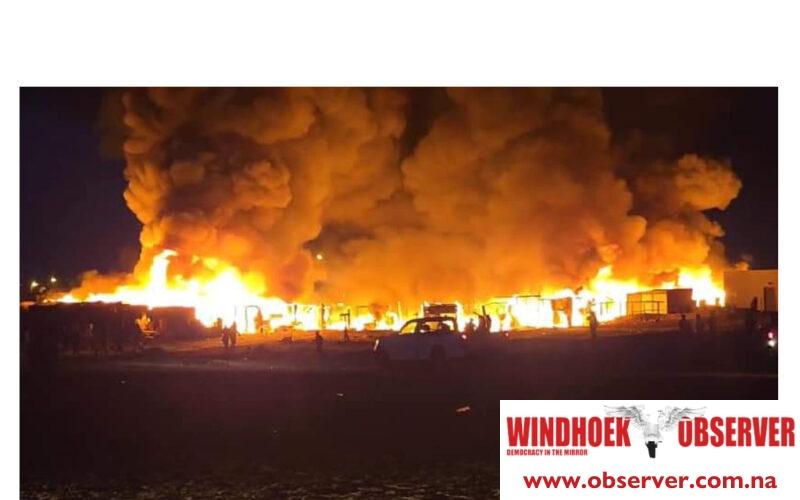Niël Terblanché
Walvis Bay municipality has confirmed that a significant number of people who were left homeless as a result of the devastating fire at the illegal informal settlement next to the Otweya area are illegal immigrants.
According to Victoria Kapenda, the chief executive officer of the town, municipal officials determined that more than 70 of the individuals who lost their homes in the blaze are non-Namibians.
“This raised concerns about the legal status of many of the settlement’s residents,” Kapenda said in a statement released on Saturday.
Kapenda added that the fire, which destroyed approximately 80 informal structures and claimed the life of one individual, has left more than 200 people homeless.
The Namibian Police still have to identify the deceased person and efforts are underway to track and inform the next of kin of his death.
This incident draws parallels with the 2020 Twaloloka fire, which also caused widespread destruction of the informal settlement.
The fire at the height of the COVID-19 pandemic also left hundreds of families destitute.
Though the scale of the current disaster is smaller, the level of destruction remains equally devastating, raising urgent questions about the safety of people in informal settlements.
She said that the municipality will be engaging with the Ministry of Home Affairs, Immigration, Safety, and Security in the coming week to address the situation concerning illegal immigrants.
According to Kapenda, the fire broke out on land owned by the National Housing Enterprise (NHE), which had been illegally occupied by the victims of the fire.
It was reported that the fire started in one of the shacks and rapidly spread through the densely packed settlement, fanned by strong winds, and ultimately left a trail of devastation.
In response, the municipality quickly coordinated temporary shelters for the displaced families, setting up large tents and providing essential items such as mattresses and blankets.
Kapenda indicated that these immediate measures will expire on 11 October, after which the displaced residents will need to make their own alternative living arrangements.
She also revealed that many of the shacks destroyed in the fire were owned by individuals who already had homes in or outside Walvis Bay and were merely leasing the structures to others, often for exorbitant prices.
“These exploitative practices have exacerbated the issue of illegal land occupation and contributed to the vulnerability of residents in informal settlements,” she said.
Humanitarian support has also flowed in from various local organisations.
Round Table Walvis Bay 36, a charitable organisation, has been instrumental in providing much-needed relief items, while Twaloloka Aid Support and Kindness (TASK) has set up a soup kitchen to feed the people displaced by the devastation of Friday.
Affected families now lack housing, food, beds, blankets, and other necessities. “We are currently working endlessly to procure as much as possible to assist those affected but require the public’s support,” said the organisation.
Any person who can assist in any way is requested to reach out to Round Table Walvis Bay 36 at +264 81 390 5555.
Beata Shaalukeni whose shack also burned down is calling on the nation to assist school-going children with books and stationery.
“While we were removing our belongings from the burning shack others were helping themselves to our belongings. The children are affected badly because all their books and school uniforms are also burned or stolen,” she said.“While we were removing our belongings from the burning shack others were helping themselves to our belongings. The children are affected badly because all their books and school uniforms are also burned or stolen,” she said.
Despite the municipality’s swift response, the fire has sparked calls for long-term solutions to housing and land occupation in Walvis Bay.
Many of the impacted residents hope to relocate to the Farm 37 urban development project, where they can rebuild their homes and live in a more secure environment.
The town’s ongoing housing crisis, which has seen informal settlements continue to grow due to a lack of affordable housing options, has drawn attention to the project, which is located to the east of Walvis Bay.




